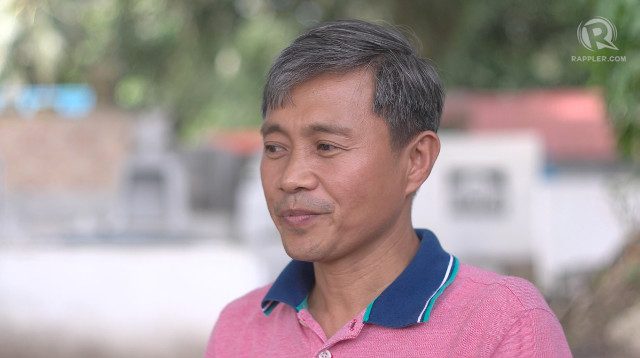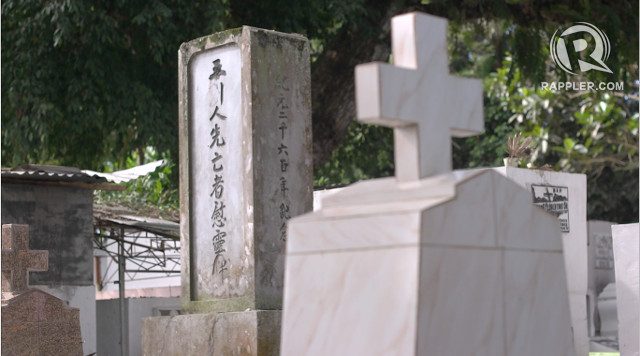SUMMARY
This is AI generated summarization, which may have errors. For context, always refer to the full article.

DAVAO CITY, Philippines – As a kid growing up in Davao City, Juseven Austero was bullied at school because of the Japanese blood that flows in his veins.
He was told by his grade school classmates to “go back to Japan.” His friends would be afraid to side with him because of the stigma it would cause.
“Lahat ng mga companions mo nawala na kasi sinasabihan, ‘O, bakit ka kumakampi sa anak ng Hapon?’ So naiiwan ka doon na mag-isa ka na lang,” Juseven told Rappler on Thursday, January 12.
(All your companions would disappear because they would be told, “Why do you side with the son of a Japanese?” So I’d be left there all alone.)
He understood their grudge against him. No doubt they were told by their parents of the war-time atrocities by the Japanese.
His own grandfather decided to change his name from Takumi to Austero to save his family from the trauma of being identified as Japanese.
Despite this unsavory history, Juseven fiercely defended his Japanese lineage.
“‘Pag may suntukan sinasabi rin nila ‘Ah, hindi basta-basta nagsu-surrender ‘yung Japanese. So ‘pag narinig ko rin ‘yun, kahit hindi ko kaya, suntukan, kahit ano. Bugbog na bugbog ako,” he recalled with a wistful smile.
(When there was a fist fight, they would say, “Ah, the Japanese do not easily surrender.” So every time I heard that, even if I knew I couldn’t hack it, I fought back. So I was really beaten up.)
Today, Juseven is still fighting for his Japanese roots. He is one of around 300 Filipinos with Japanese blood hoping to gain official recognition from the Japanese government as Japanese descendants.
Most of these Japanese descendants have not yet been given recognition because all records of their lineage were destroyed during the war.
Juseven had almost given up all hope of winning his fight, until he heard Japanese Prime Minister Shinzo Abe would be visiting Davao City from January 12 to 13.
It seemed like fate, that the first head of state to visit his hometown would be Japanese. His hope returned like a spring of cherry blossoms.
“With the presence of the Prime Minister, the hope that was lost – ‘Ah, it’s okay even if I never get recognition,’ – it came back because of the coming here of, not just ordinary Japanese but leaders of Japan,” he said in a mix of English and Filipino.
“It gives us courage that we should not lose hope. For example, if the records aren’t traced, there could be automatic recognition for us,” he added.
‘The warmest welcome’
Ines Mallari, another 3rd-generation Japanese descendant, believes Abe’s visit affirms the recognition already given to some lucky descendants.
“We feel that we are the living bridge between Japan and [the] Philippines. [His visit] fortifies our belief that we are recognized as Japanese descendants,” she told Rappler.
Ines, granddaughter of a Japanese baker, has been working hard to promote friendship between the two countries. She heads the Philippine Nikkei-Jin Kai Incorporated or the Federation of Japanese Descendants in the Philippines.
She is also president of Mindanao Kokusai Daigaku, an international school in Davao City that teaches Nihonggo and Japanese culture to students of all nationalities and ethnic origins.
“We are more than happy to welcome him. We will give him the warmest and loudest welcome that we can give him because we feel we are part of his coming here,” she said on Thursday.
Abe will be visiting Ines’ school as part of his activities in Davao City.
Seventy-year-old Carmen Apigo is among the few remaining 2nd-generation Japanese descendants still in Davao City.
She was born in 1946, the year when many of the Japanese in Davao City were repatriated following World War II.
Her father returned to his hometown of Okinawa, leaving behind Carmen and her mother. Though her father owned large tracts of land in Davao City, mother and daughter could no longer return to them as they were claimed by Filipino guerrillas.
Full circle
After spending some time in the Visayas, Carmen returned to Davao City and lived in Calinan, one of the areas once heavily populated with Japanese.
Carmen could not help but get teary-eyed knowing she would see Abe the next day.
She and some other 2nd-generation descendants were able to shake hands with Emperor Akihito and Empress Michiko when they visited Manila last year.
“That time, Japanese descendants really cried because, really, I don’t know how we feel, it was really exciting. Maybe this is also true with [Prime] Minister Abe as soon as we meet him tomorrow,” she said.

Like Carmen, Juseven is preparing for Abe’s visit. He spent Thursday afternoon cleaning and clearing Mintal Cemetery, one of the places in Davao City to be visited by Abe’s wife Akie.
Mintal Cemetery is where many of the earliest Japanese residents are buried. But after the war, their graves were dug up by Filipinos thinking the Japanese had buried treasure there, said Juseven.
The city government later condemned this act, gathered the desecrated remains, and constructed a shrine in place of the destroyed graves.
And one January 13, many lifetimes later, the living offspring of the dead will be honored by the presence of their motherland’s leader. – Rappler.com
Add a comment
How does this make you feel?
There are no comments yet. Add your comment to start the conversation.